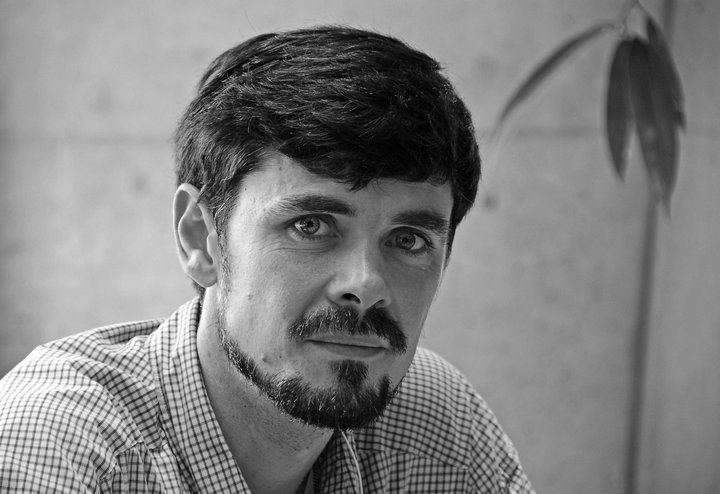During his lifetime, the poems of Wilmer Mills were published in journals (The New Republic, The Hudson Review, The Southern Review, The New Criterion, among others), in two anthologies (Penguin/Longman Anthology of Contemporary American Poets, 2004; The Swallow Anthology of New American Poets, 2009)and in two books: a chapbook, Right as Rain (Aralia Press, 1999) and a full-length collection of poems, Light for the Orphans (Story Line Press, 2002). After working as a carpenter, sawmill operator, songwriter, and artisan bread baker, he became the Kenan Fellow at U.N.C. Chapel Hill. Wil was the Writer-in-Residence at Covenant College when he died in 2011 after a two-month battle with liver cancer. After his death, the University of Evansville Press published his Selected Poems (May 2013), edited by his wife Kathryn.
Light for the Laundromat
.
Mostly evenings now I bring
My kinks and wrinkles of the week
To wash, then wait in front of rows
Of glass-door dryers curling waves
Of laundered clothing, some damp,
Some near their quarter’s stopping place.
The hot machines are best to watch.
Light garments tumble dry and loose
And play their cyclical charades
With empty sleeves and cuffs, winning
Hands down, since who could guess the scenes
And shapes they feign to motion for.
It’s possible my mother could.
She used to point at clouds and name
The elephants and bears of air
Piled up above our river home,
The river in Brazil where half-
Dressed women lined the banks to wash.
I must confess I found them bronze
And beautiful, and when their clothes
Were hung to dry I thought the sun
Had made them clean and not the soap.
This was the mission field of shine
For which my father had forsaken
Heritage and farm. He preached
About the light of the world that made
A body beautiful within
And purified its inner raiment.
I, too, believed and took his faith
When chills and fever made me freeze
And sweat through every sheet and blanket.
But looking out to where my own
Malarial bed sheets were hung,
I knew that sunlight made them clean
Because it happened several times
That fever brought a river girl
To wipe my legs with alcohol.
Each time I pointed, “Look she’s by
The window,” all they saw was glass,
White paint, and then my chills came back,
And she dissolved through cane-seat chairs
Below the sill and lit the floor
With little octagons of light.
Here tonight, in the laundromat,
The faces turn and turn. The lights
Are all florescent so they buzz
Above a wall of casement windows
Trying to hold the darkness out.
I didn’t want to come this late
But had to since my button-downs
Resembled poorly folded maps
Of land where all the trees are gone.
The dryers one by one have stopped.
Their free-association game
Of animated arms is over.
I saw only shirts bowed low
In rows, becoming lighter, sleeves
Spread out so anyone could guess
The posture in their pantomime,
A pose of praise for laundering light
In that subcontinent of sun.
My Queen of Hearts
.
The other day our daughter lay on the ground
And watched the clouds that shuffled over her.
Sky was the glassy palace where she crowned
Her golden hair with twisted hay and clover.
She looked like girlhood photographs of you,
But since I never knew you as a child,
I wondered if the picture in my head was true:
You as a princess with your aces wild,
Not yet the noble woman next to me.
Throughout the years now woven in between,
I’ve played the joker, feigning regency,
But here, full house, with you as queen,
Your heart from girlhood lives in our young lass
Who gave you the crown she made of braided grass.
Fallen Fruit
.
The very day that Ingmar Bergman died,
I read a book on pictures, words, and sums
That glossed the first time Helen Keller cried.
Beside me, there were piles of rotting plums,
The neighbor’s summer windfall gone to waste.
A yellow jacket landed on my chair,
And colors on its abdomen were spaced
So perfectly I couldn’t help but stare.
My daughter asked me, “How are shadows made?”
And, blinded by how clear and luminous
Her eyes were then, I suddenly felt afraid
That I would disappoint the obvious,
The sensual world in words I’d merely choose.
But then my son asked, “What if time could slip?”
His Time! Her Light!
Though Eden’s ingénues,
Their minds and garden-hearts could already lisp
In metaphors that I would not dispute,
Could see the world that isn’t there, could smell
The sweetly fecal scent of fallen fruit
That issues out of symbols like a spell.
I can’t protect them; they were bound to see.
The Fall was knowing what it meant “to stand”
Then painting the paradise that used to be
In language that could raise it from the sand.
Thinking in pictures, feeling in words, I cried
When Bergman died, like Helen when she knew
The beauty of the world, what liquefied
Across her hands that felt and wrote and drew.
*****


